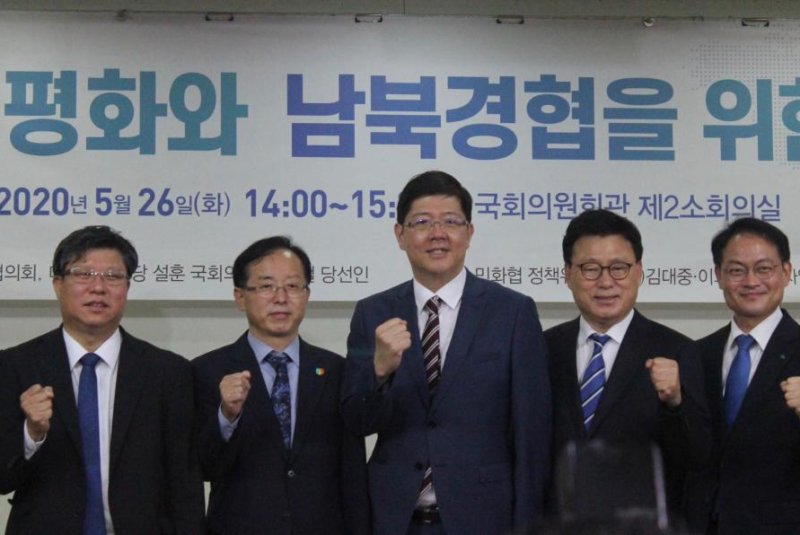Kim Hong-gul (C), president of the South Korean Council for Reconciliation and Cooperation, and son of Nobel Peace Prize recipient and former President Kim Dae-jung, said chilled inter-Korea relations is a “crisis,” during a seminar at the National Assembly in Seoul on Tuesday. Photo by Elizabeth Shim/UPI
SEOUL, May 26 (UPI) -- Seoul's advocates for continued engagement with North Korea may be becoming restless about stalled talks.
Kim Hong-gul, president of the South Korean Council for Reconciliation and Cooperation who is the son of former President Kim Dae-jung, said Tuesday at a seminar at Seoul's National Assembly compound he is willing to step in to resume high levels of inter-Korea exchange.
"If the government cannot [engage the North], I will do my best to make it possible to actively engage in inter-Korea exchanges, even at the private level," Kim said, referring to his NGO.
Kim, a lawmaker-elect with the ruling Democratic Party, did not provide details regarding any projects he may be pursuing, but Kim Yong-hyun, a North Korean expert at Dongguk University, said at the seminar Kim Hong-gul's group could be pursuing North Korea health and humanitarian assistance projects amid the coronavirus pandemic. Kim Hong-gul neither confirmed nor denied the statement on Tuesday.
Kim Hong-gul, who has met with Kim Jong Un as part of a delegation attending Kim Jong Il's funeral in 2011, paid tribute to his late father before Democratic Party lawmakers. Kim Dae-jung's "noble will and insight" will serve as a source of guidance amid challenges, he said.
The South Korean politician's assessment of deadlocked negotiations with the North as a "crisis" was shared among other lawmakers gathered Tuesday.
Sul Hoon, a veteran lawmaker with South Korea's Democrats, said peace is "desperately needed" on the Korean Peninsula. It is up to Seoul to arrive at the proper solution, while getting Washington to understand the South Korean progressive view of the North: Engagement is better than a nuclear standoff.
"The key is in the hands of the United States," the lawmaker said, citing the potential breakthrough of a "peace declaration" between the United States and North Korea, as well as a more easygoing U.S. approach to North Korea sanctions.
The Kim Jong Un regime is under heavy embargoes for military provocations and nuclear weapons development. But Democratic Party lawmaker Kim Gyeong-hyeop suggested at the seminar that trucks of medical supplies originating from South Korea may have been blocked due to sanctions.
South Korean sanctions, known as the May 24 measures, could be preventing aid projects. The sanctions were put in place under former President Lee Myung-bak. Earlier this week, Seoul's unification ministry suggested some exemptions could be applied for North Korean ships entering South Korean waters.
Kim Hong-gul and Sul said the impasse between the United States and North Korea should not hold Seoul back from actively pursuing talks.
Seoul offered dialogue to the North last year, following the collapsed U.S.-North Korea summit in Vietnam; Pyongyang turned down the invitations.
Kim Hong-gul said he believes that even a "small achievement for peace on the Korean Peninsula will have a very positive impact, regardless of how U.S.-North Korea relations evolve next year," referring to the U.S. presidential election in November.
North Korea may not be prioritizing friendly ties with the South, however.
On Sunday, Pyongyang's state media reported Kim Jong Un discussed strengthening his country's nuclear deterrence and placing its military on high alert.
Analyst Kim Yong-hyun said Tuesday the objective of the North Korean leadership is to survive.
Kim Jong Un's trip to the coastal area of Wonsan in April when he went "missing," shows that the novel coronavirus is "affecting the leadership directly." Kim Jong Un may have pursued a similar strategy of hiding out, in January, during an earlier stage of COVID-19, the South Korean analyst said.
Kim Yong-hyun also suggested there are still ways to engage with Pyongyang amid North Korea's pandemic-induced isolation. He said inter-Korea cooperation on disease prevention and control would be a path forward.
"North Korea has closed its doors but left the light on," the analyst said. "It's the best choice North Korea can make."















